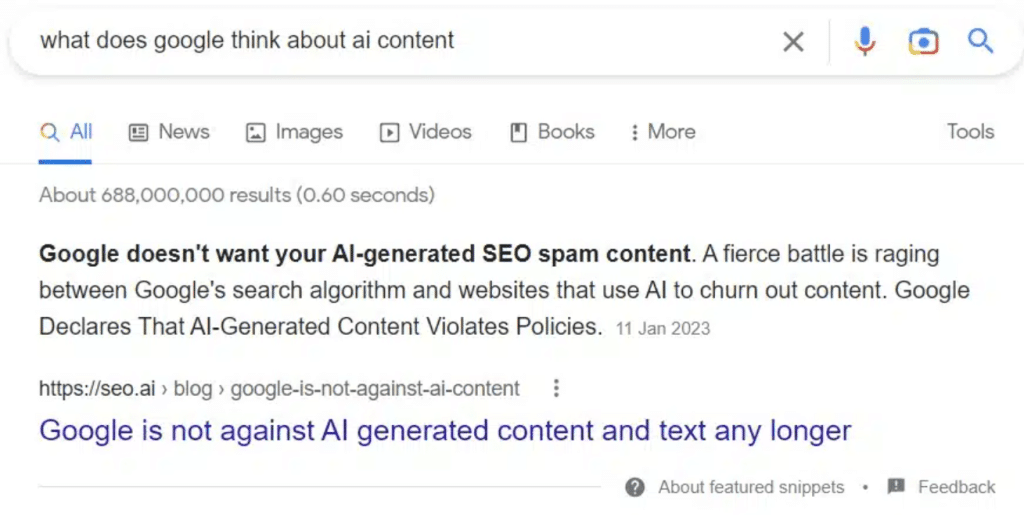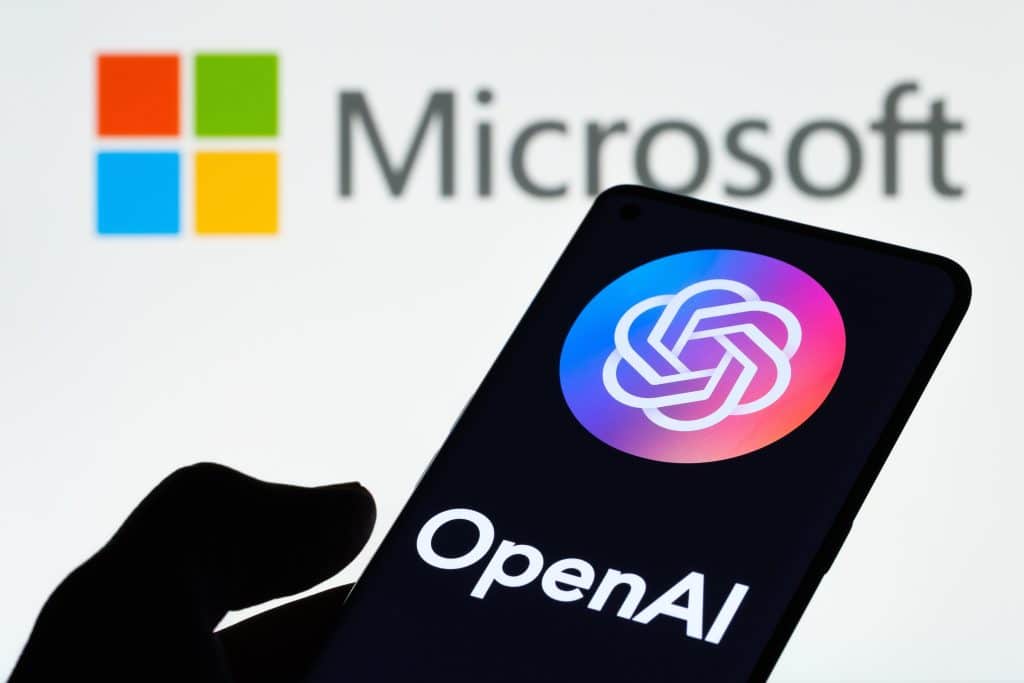
As time passes, AI’s role in content creation is increasing. Tools such as Jasper.ai, ChatGPT, and more are creating AI-generated content that can captivate your audience. As a result, it is becoming increasingly beneficial to integrate AI into your organic marketing strategy to produce high-quality content that resonates with your target audience.
However, many content creators and SEO professionals still struggle to create content that meets Google’s quality guidelines.
Fortunately, Google has clarified that they prioritize quality content over whether it was created by humans or AI, claiming that:
“At Google, we’ve long believed in the power of AI to transform the ability to deliver useful information, rewarding quality content, no matter how it was created.”

This means businesses can leverage AI tools to create high-quality content that will improve SEO performance without worrying about compromising their rankings – That’s where an organic marketing agency can help.
In this post, we will explore how AI-generated content fits into our well-established approach to providing people with helpful content in search, with a particular focus on SEO. There’s something here for everyone, so we hope you can utilize these tips for your own work!
Need Help With Your SEO Strategy?
Our team of experts is always available!
AI and SEO: Making Sense of Google’s Policies
Google’s stance on AI-generated content has been a topic of debate in recent years. Decisive declarations such as “Google declares that AI-generated content violates policies” and “Google doesn’t want your AI-generated SEO spam content” have fueled concerns among content creators and marketers.

However, despite Google’s prior negative stance, people continue to use AI tools to write content. During the short period when Google opposed AI content, tools were created to check whether it was created using AI or humans, with partial success, as you can see in this video by WP Eagle:
A brief history of Google vs. AI-Generated Content
The emergence of AI tools for content creation has dramatically impacted the content marketing landscape in recent years. Despite previously opposing AI-generated content, Google’s announcement that they prioritize quality content over its author has changed the game.
However, this wasn’t always the case. In 2021-2022, communities of bloggers and content creators began to take notice of the increasing dominance of AI tools in their SERPs and feeds, culminating in DALL·E going viral and enthusiasts adoring Midjourney.
But the most significant blow to Google came with the rise of ChatGPT, OpenAI’s competitor to Google’s search engine. As users, professionals, and media began to question if the era of searching on Google was ending, Google launched its own chatbot, Bard, to compete with GPT.
The AI train has left the station, and Google couldn’t afford to be left behind.
Best Practices for Creating High-Quality AI-Generated Content that Ranks on Google
Creating high-quality AI-generated content that ranks on Google requires a strategic approach. Google has made it clear that AI-generated content can be just as valuable as human-generated content, but it must meet certain standards to be considered “Good Content.”
To ensure your AI-generated content is up to par, consider the following best practices:
Avoid Spammy Content
The concept of AI-generated content being synonymous with spammy content is a common misconception. Google’s previous stance on AI-generated content was often misunderstood, confusing content creators and marketers.
However, Google’s recent clarification of its policies has shed light on the issue. The statement “We don’t want spammy AI content” means that the problem is not AI content but rather content that is spammy, irrelevant, or of low quality.
In other words, AI-generated content is not inherently bad; its value depends on the quality of the content it produces.
To avoid creating spammy AI content, brands should focus on quality, relevance, and usefulness to their target audience.

What is Spam Content?
Spammy content refers to anything that detracts from a user’s experience and fails to provide valuable information. Google has a document that sets out what they consider spammy content to be, and the list includes things like:
- Text that is irrelevant or makes no sense to the reader and is stuffed with keywords solely to improve rankings.
- Text that is translated by automated tools without human curation or review.
- Text that is generated automatically without any focus on quality or user experience.
- Content that is created using automated techniques that obfuscate, paraphrase, or synonymize text.
- Text generated from scraping feeds or search results.
- Stitching or combining content from different web pages without adding sufficient value.
Google periodically releases updates that provide additional guidance on what they deem to be spammy content. By avoiding these tactics and creating valuable, high-quality content, businesses can ensure that their content meets Google’s standards and provides value to their audience.
What is Quality Content?
- Quality content goes beyond the mere avoidance of spammy tactics. It provides valuable information that answers a searcher’s question and adds new knowledge to the conversation.
- Quality content should be sourced from an authoritative website and written by an author with authority in the topic at hand.
Ultimately, it’s up to each individual to assess whether the content they create meets these criteria, but having a keen eye for detail and being mindful of what constitutes quality should help them craft better content.
Looking to Improve Your Content Strategy?
Our team of experts is always available!
Experience, Expertise, Authoritativeness, Trustworthiness
Goodbye E-A-T, welcome E-E-A-T.
For years, Google’s guidelines included E-A-T: expertise, authoritativeness, and trustworthiness. A few weeks before they announced their acceptance of content written by artificial intelligence, they added another E to the acronym – Experience. This was no coincidence – a machine cannot have experience in any field.
To successfully take on the challenge of crafting content for the future, it pays to hold onto your humanity. This means inserting some personal touches into your writing – adding a phrase like “in my opinion,” “from my experience,” or personal stories, like one I’m about to tell you about my mother-in-law.

If you haven’t done this until now, it’s worth starting. On the other hand, don’t stress too much – not all content writers have direct experience with every topic that comes their way. This is where working with a content creation and marketing agency can help you transfer your experience and expertise into quality content.
Check Your Facts
AI tools are “creative assistants” but are not quite yet research assistants. They are meant to be creative, not precise. Therefore, you should always check the facts, quotes, and statistics they provide. Confirming that the tool hasn’t changed or altered this information is wise, even if you pre-enter data and statistics into the prompt.
Speaking of mothers-in-law from our previous examples, when mine played with an AI tool and asked it to write an academic paper for her, it inserted citations and references to other articles. When she checked, she found out that the researchers exist, and the articles and the quotes are indeed in the research fields of these researchers – but both the articles and the quotes are entirely made up.
Choose your AI tool
Choosing the right AI tool for content creation is key. ChatGPT can be a good tool for writing code and regular expressions, but it isn’t designed specifically with content creation in mind. For that, there are more suitable options.

Some AI tools give you a finished article as soon as you enter a brief, while others allow you to ‘drive’ them while they create the content – adjusting the text on the go. Personally, we prefer these tools because they enable us to pay more attention to the written text, tweak facts and change direction if needed, and add our own words to shape and guide the output.
While it may be tempting to simply get an output of several hundred words at the click of a button, taking things more slowly produces better-quality results.
Some Things are (Still) Better Without AI
Some things are indeed better without AI. This article, for instance, was written entirely by a human – no AI involved!
Some niche subjects requiring expertise, research, and experience, such as the history of Google versus AI, tend to read better without the use of AI-generated content.
AI can be great for guides and explanations, but articles with anecdotes and a personal or professional point of view are generally best written with a human touch – at least partially.
Using AI for Improved Creativity
If you don’t feel comfortable using AI to write content for you, that’s fine, but you can still draw on its creativity. With AI tools, you can do things like:
- Get content ideas that go beyond keyword research (like search volume)
- Receive suggested outlines and headings for articles.
- Generate titles for your articles.

- Write an excerpt, meta title, and meta description.
- Shorten and simplify long paragraphs – useful for FAQ sections!
- Get help with the introductory paragraph or conclusion while you handle the body of the article.
Key Takeaways
Here are the key takeaways when it comes to using AI for content creation:
Dos:
- Don’t be afraid to use AI tools for content creation – it’s not against Google’s guidelines.
- Read the content and judge it from a human point of view – would you be satisfied with this? Does it answer your questions?
- Provide new information – this secret sauce will get you into the search results.
- Check facts – remember, an AI assistant is creative rather than factual.
- Add experience – EAT: expertise, authority, reliability, and use first-person words where appropriate.
- Use your judgment – some things are best written by humans. Make use of AI for ideas and small details.
Don’ts:
- Don’t write “fluffy” content that doesn’t answer a question or fulfill a need, and don’t insert words for nothing.
- Don’t treat AI as a ghostwriter – read any AI-generated content carefully and make adjustments when necessary.
- Don’t upload AI content without fact-checking.
- And don’t give up on your own unique knowledge and experience if you have it!
To conclude, AI tools can greatly help create content but won’t replace human judgment. Use your own unique knowledge and experience when appropriate, as some things may (still) be better left to humans! If you’re looking for additional help, consider hiring an organic marketing agency to maximize the potential of your content.
Looking for an Organic Marketing Agency?
Our team of experts is always available!
FAQs (Frequently Asked Questions)
In February 2023, Google issued a statement that they don’t care who wrote the content, human or AI, as long as it meets Google’s content guidelines.
Yes, if the content is of high quality. “Quality content” has several definitions in the article, and there is no reason why content created with the help of AI will not meet these requirements.
Ensure that you carefully read any AI-generated content and make adjustments when necessary. Additionally, make sure to fact-check any information presented in your AI-generated text before publishing it. Finally, use your own judgment and experience when appropriate – some things may be better left to humans!
Use your AI tool to generate ideas and details while still using your own unique knowledge and experience where appropriate. Always have a human read over any generated text before publishing – this way, you can ensure that the final product meets all of your standards for quality content.






